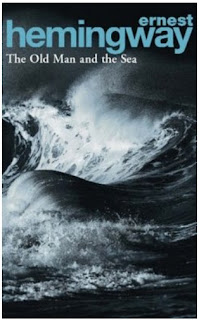The Old Man and The Sea by Ernest Hemmingway
This novella portrays the struggle of an old fisherman, who has had a grim luck lasting 84 days before he makes a prize catch of a giant marlin. The struggle to land the fish spans three days and two nights. I was glad that the old man survived the ordeal; otherwise, the cover picture of a dark sea broken in storm portends sadness for the reader.
But, the protagonist's living triumph does not make me a fan of the book. It did not appeal to me the way it has besotted the imagination of some of the raving reviewers. A colleague swore by its appeal on Thursday last; I couldn’t get started that evening. Friday evening set me on the course. Saturday night I laid the book to rest. Lesson learnt: To factor in my wife’s opinion about a book. I bought her this novella considering the short flights she took at reading. The book bored her to death. She must be heartbroken herself for having given up too early. She amply made up for her stasis by reading up two other classics.
Literary techniques are like surgical incisions that fasten symbolism and meaning in the body of the work. The stitches must dissolve in time without leaving a scar. The technique must subserve the narration. If the technique is laid over-bare, the outcome may appeal but only to those readers whose appreciation of literature is appreciation of technique. Hemmingway fans contend that a strong symbolism is the book’s scoring point. It depicts at once man’s struggle and oneness with nature. The story is deficient not in the idealism it trundles upon, but it is brought home not the way I expected it to.
The book is a monument of Hemmingway's admiration for a Cuban fisherman. He has made a virtue of fishing and put some kindred words into the fisherman's mouth while he addresses the fish, the bird, the sun and the sea. Old age brings in the element of sympathy and senility. The mumbo jumbo of the struggling fisherman is supposedly the glint of revelation. Maybe, imploring the heavens for assistance betokens surrender. How? Don't aske me. It is symbolic.
And, if the old man’s soliloquy is that notorious stream-of-consciousness, the stream is clearer than Joyce’. I am comfortable with omniscience working from outside. Hemmingway that way is readable. Also, his prose is vivid, fluid, and centered. It makes you frown when the sun is shining brightly on the white sand and makes your saliva taste brine when the marlin lashes up water from its scythe-like tail. Whatever unperceived claim the book has on the minds of the people, it must be the story-telling quality of its prose. Unfortunately, here, a story is being told when it does not exist.
My rating: 5/10
But, the protagonist's living triumph does not make me a fan of the book. It did not appeal to me the way it has besotted the imagination of some of the raving reviewers. A colleague swore by its appeal on Thursday last; I couldn’t get started that evening. Friday evening set me on the course. Saturday night I laid the book to rest. Lesson learnt: To factor in my wife’s opinion about a book. I bought her this novella considering the short flights she took at reading. The book bored her to death. She must be heartbroken herself for having given up too early. She amply made up for her stasis by reading up two other classics.
Literary techniques are like surgical incisions that fasten symbolism and meaning in the body of the work. The stitches must dissolve in time without leaving a scar. The technique must subserve the narration. If the technique is laid over-bare, the outcome may appeal but only to those readers whose appreciation of literature is appreciation of technique. Hemmingway fans contend that a strong symbolism is the book’s scoring point. It depicts at once man’s struggle and oneness with nature. The story is deficient not in the idealism it trundles upon, but it is brought home not the way I expected it to.
The book is a monument of Hemmingway's admiration for a Cuban fisherman. He has made a virtue of fishing and put some kindred words into the fisherman's mouth while he addresses the fish, the bird, the sun and the sea. Old age brings in the element of sympathy and senility. The mumbo jumbo of the struggling fisherman is supposedly the glint of revelation. Maybe, imploring the heavens for assistance betokens surrender. How? Don't aske me. It is symbolic.
And, if the old man’s soliloquy is that notorious stream-of-consciousness, the stream is clearer than Joyce’. I am comfortable with omniscience working from outside. Hemmingway that way is readable. Also, his prose is vivid, fluid, and centered. It makes you frown when the sun is shining brightly on the white sand and makes your saliva taste brine when the marlin lashes up water from its scythe-like tail. Whatever unperceived claim the book has on the minds of the people, it must be the story-telling quality of its prose. Unfortunately, here, a story is being told when it does not exist.
My rating: 5/10

Comments